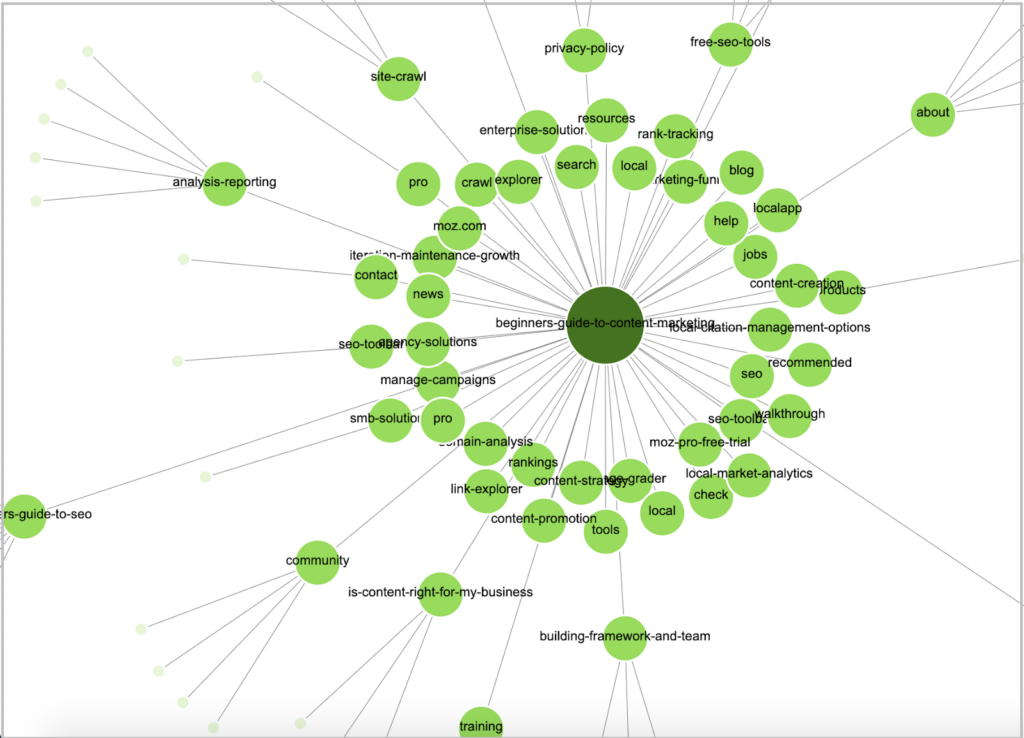Keyword research is a vital aspect of SEO, helping websites to rank higher in search engine results pages (SERPs) and attract more organic traffic. Traditional keyword research involves finding a list of relevant keywords and incorporating them into website content. However, this approach has become less effective as search engines have become more sophisticated and focused on the overall content of a website rather than just individual keywords.
To address this, SEO experts have started to use content clusters as a way of organizing content around a broad topic. In this article, we will explore the concept of topic clusters in more detail and explain how they can be used to improve SEO results.
What Are Topic Clusters?
A topic cluster is a group of content pages that are centered around a core topic, with each page covering a specific subtopic related to the primary subject. The pages within a topic cluster are linked together, creating a web of interlinked content that provides a comprehensive resource on a particular subject.
Topic Cluster Example 1
If the core topic is “gardening,” the subtopics could include “organic gardening,” “container gardening,” “landscaping,” and “composting.” The pages related to the different subtopics would link back to the core page, creating a cohesive web of content.
Topic Cluster Example 2
If the topic is “SEO,” the subtopics could cover “keyword research,” “on-page SEO,” “technical SEO,” and “link building.” Each page would tackle a specific aspect of SEO in more detail, with links to other pages within the topic cluster.
Topic Cluster Example 3
If the topic is “social media marketing,” the subtopics could include “Facebook advertising,” “Twitter marketing,” and “Instagram influencer marketing.” The information on social media marketing would be divided into specific topics on separate pages that are linked within a cluster.
By creating multiple pages around different subtopics, you can provide a more comprehensive resource to your website visitors and make it easier for them to find what they are looking for. This can also help to improve the user experience, making it more likely for them to spend a longer time on your website and be converted into paying customers.
Why Use Topic Clusters for Keyword Research?
There are several reasons why topic clusters are an effective strategy for keyword research and SEO:
Comprehensive coverage of a topic
Search engines prioritize content that provides full coverage of a topic rather than just a list of keywords. By creating a topic cluster, you can demonstrate your expertise and authority on a given subject, which can improve your search rankings and attract more organic traffic. Using long-tail keywords with good search volume within your content will help your website rank higher in search as well.
Enhanced internal linking strategy
Internal linking is an important aspect of SEO, as it helps search engines crawl and index your website more easily. By using topic clusters, you can create an effective internal linking structure that will improve the visibility of all the pages in your cluster.
Target a wider range of keywords
Targeting multiple subtopics within a topic cluster will allow you to target a wider range of keywords. This can help you to rank for more search queries related to your core topic, increasing the chances that your website will appear in search engine results pages (SERPs).
Enhanced user experience
Topic clusters provide a better user experience by organizing your content around broader themes and making it easier for readers to find the information they need. This can lead to higher engagement and lower bounce rates, which can also improve your search engine rankings.
More backlinks generated
By creating comprehensive and well-organized content, you can attract more backlinks from other websites. This is beneficial for SEO as it helps to increase the authority of your website in the eyes of search engines. Backlinks are also vital for improving your SERP rankings.
How to Create Topic Clusters
Creating topic clusters for your content marketing strategy requires a systematic approach, including the following steps:
1. Conduct a Content Audit
The first step in creating topic clusters is to conduct a content audit. This involves reviewing your existing pieces of content and identifying content gaps and opportunities for improvement. Look for cluster content that can be grouped together around a common theme or topic. An audit typically involves gathering data on page titles, URLs, content length, and keywords used.
2. Identify Core Topics
The next step is to identify your core topics and remember to evaluate search intent. These should be broad themes or subjects that are relevant to your business and your target audience. Examples might include “digital marketing,” “content creation,” or “social media strategy.” The goal is to create clusters of related content around these core topics.
3. Create Subtopics
The next step is to create subtopics that are related to each core subject. Each subtopic should be a specific aspect or angle of the core. Content ideas for a business like ours might include “SEO best practices,” “copywriting tips,” or “Facebook advertising.” These subtopics should focus on providing detailed information.
4. Map Subtopics to Core Topics
Mapping the subtopics out is the next step. This involves linking the subtopics back to the core topic and can be done by adding internal links to related content pages in your cluster. The goal is to create a network of related relevant content that covers all angles of the core subject.
5. Create Pages
The final step is to create pages for each subtopic. Each page should be optimized for a specific keyword related to the subtopic and should link back to the core topic page. This will create a network of interlinked pages that demonstrate your expertise and authority.
The process of creating topic clusters can be time-consuming and complex. To get the most out of your content, it is important to have a comprehensive keyword research and content strategy. Working with a digital marketing agency that specializes in search engine optimization can help to ensure you are creating content that will drive organic traffic and improve your SERP rankings.
Best Practices for Creating a Topic Cluster Strategy
Now that you know the basics of topic clusters and how to create them, let’s explore some best practices for creating effective topic clusters:
Research Your Target Audience
Doing research on your target audience can help you to identify relevant topics and keywords. This will help you to create content that is more aligned with their needs and interests, resulting in higher engagement and better performance in search engines.
Define Your Core Topics
Defining your core topics or pillar content is essential for creating effective topic clusters. These should be broad subjects that can be broken down into more detailed subtopics. Make sure the topics are relevant to your audience and match their interests.
Optimize Your Content
Optimizing your content will help you to attract more organic traffic and improve your SERP rankings. This includes using target keywords in titles, headings, meta descriptions, and body copy. Additionally, make sure to include internal links between blog posts for a better user experience.
Track Your Results
Tracking your results is essential for measuring the success of your topic clusters. Use analytics tools to track metrics such as organic traffic, bounce rate, and conversions. This will help you to refine your content strategy and make improvements where necessary.
Update Content Regularly
Finally, make sure that you are regularly updating and refreshing your content. Search engines prefer to see fresh content, so be sure to review and update your topic clusters on a regular basis. This will also help ensure that your content stays relevant and up-to-date.
Creating effective topic clusters requires time and effort but can be a powerful tool for driving organic traffic and improving search engine rankings. With the right keyword research and content strategy, you can create topic clusters that will engage your audience and drive better results.
FAQs on Topic Clusters for SEO
Here are some common questions about topic clusters and how to use them effectively for SEO:
Can topic clusters be used for all types of websites?
Yes, topic clusters can be used for all types of websites. Whether you run an e-commerce site, a blog, or a news site, organizing your content into topic clusters can help improve your SEO strategy and provide a better user experience.
Should all pages in a topic cluster be interlinked?
Yes, all pages in a topic cluster should be interlinked. This helps search engines understand the relationships between your content and can improve your search engine rankings.
How many subtopics should be included in a topic cluster?
The number of subtopics in a topic cluster can vary depending on the core topic and the amount of content available. In general, aim to include 3 to 5 subtopics per core topic.
Should I update my topic clusters regularly?
Yes, it’s a good idea to update your topic clusters regularly to ensure that your content is up-to-date and relevant to your audience. You can also add new subtopics or core topics as your business evolves. The best practice is to review and update your topic clusters at least once per quarter.
Can topic clusters help with voice search optimization?
Yes, topic clusters can help with voice search optimization. By organizing your content into clear and comprehensive topic clusters, you can improve your chances of appearing in voice search results for related queries.
How do I determine the core topics for my topic clusters?
To determine the core topics for your topic clusters, start by identifying the main themes or topics that are most relevant to your business or industry. You can use keyword research tools, customer feedback, and competitor analysis to help you identify these core topics. From there, you can create a list of subtopics that support each core topic and build out your topic clusters.
Can topic clusters help with content promotion?
Yes, topic clusters can help with content promotion. By grouping related content together in a topic cluster, you can create a comprehensive resource that can be promoted as a whole. This can help attract more links and social shares, which can, in turn, improve your search engine rankings and drive more traffic to your site.
Let Our Expertise Work For You
Topic clusters are a powerful tool for SEO and content marketing, helping websites to organize their content around broader themes and improve their search engine rankings.
By creating comprehensive topic clusters that cover multiple subtopics related to a core topic, websites can demonstrate their expertise and authority on a given subject, attract more organic traffic, and enhance the user experience.
If you’re looking to improve your website’s SEO strategy, optimize your content, and drive more organic traffic, get in touch with Markitors.
With years of experience in white hat content marketing and SEO, our team can help you create comprehensive topic clusters that will engage your audience and drive better results. We can also help you with keyword research, content creation, on-page optimization, and more.
Contact us today to learn how Markitors can help you improve your SEO efforts.







